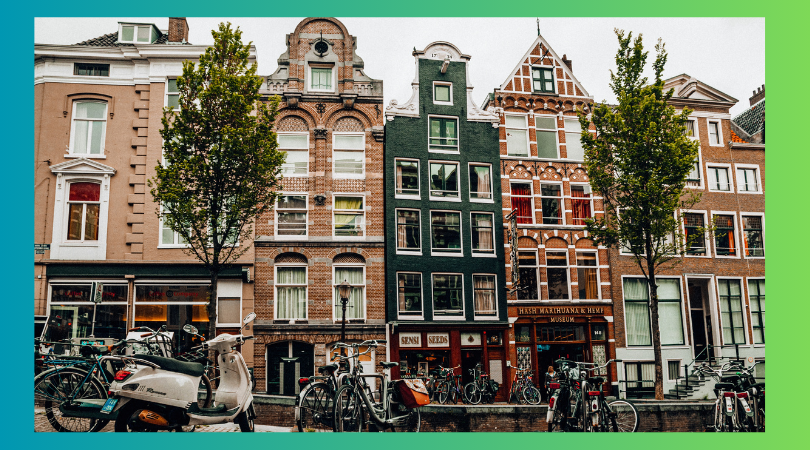The Netherlands, often referred to as Holland, is a country that offers a unique blend of rich history, vibrant culture, and innovative modernity.
Here are 100 interesting facts about this intriguing nation:
- Low-Lying Land: The Netherlands means “low countries” due to its flat topography. About one-third of the country lies below sea level.
- Dikes and Polders: The Dutch have mastered water management with their intricate system of dikes, dams, and polders, reclaiming land from the sea.
- Windmills: There are approximately 1,000 traditional windmills scattered throughout the country, many of which are still functional.
- Tulip Mania: In the 17th century, the Dutch experienced “Tulip Mania,” where tulip bulbs were worth more than gold.
- Keukenhof Gardens: Known as the Garden of Europe, Keukenhof is one of the world’s largest flower gardens, showcasing millions of tulips.
- Bicycle Culture: With more bicycles than people, the Netherlands is a cyclist’s paradise. There are over 35,000 kilometers of cycle paths.
- Canals of Amsterdam: Amsterdam has over 100 kilometers of canals, earning it the nickname “Venice of the North.”
- Tallest People: Dutch men and women are the tallest on average in the world, standing at 6 feet and 5 feet 7 inches, respectively.
- Legalized Euthanasia: The Netherlands was the first country to legalize euthanasia in 2002.
- Liberal Attitudes: The Dutch are known for their liberal attitudes toward social issues, including drug policy and LGBTQ+ rights.
- World’s First Stock Exchange: The Amsterdam Stock Exchange, established in 1602, is the world’s oldest.
- Innovative Architecture: Dutch architecture is famous for its creativity, including the unique Cube Houses in Rotterdam.
- Water Management: The Delta Works project is a series of constructions built to protect the country from the sea, often considered one of the Seven Wonders of the Modern World.
- Famous Painters: The Netherlands is the birthplace of renowned artists like Vincent van Gogh, Rembrandt, and Vermeer.
- Van Gogh Museum: Amsterdam hosts the largest collection of Van Gogh’s paintings and drawings.
- Anne Frank House: The house where Anne Frank wrote her famous diary during World War II is now a museum in Amsterdam.
- King’s Day: Celebrated on April 27th, King’s Day is a national holiday marked by orange-clad celebrations and street markets.
- Cheese Markets: The Netherlands is famous for its cheese, with traditional markets in towns like Alkmaar and Gouda.
- Dutch East India Company: Founded in 1602, it was the first multinational corporation and the first to issue stocks.
- Direct Democracy: The Netherlands practices a form of direct democracy where citizens can initiate legislation through referenda.
- Peace Palace: The Hague houses the Peace Palace, home to the International Court of Justice and the Permanent Court of Arbitration.
- Diverse Landscape: Despite being flat, the country has diverse landscapes, including forests, sand dunes, and heathlands.
- Bilingual Nation: Most Dutch people speak English fluently, making it one of the most bilingual countries in the world.
- Traditional Costumes: In regions like Volendam, traditional Dutch costumes are still worn, attracting many tourists.
- UNESCO Sites: The Netherlands is home to several UNESCO World Heritage Sites, including the historic windmills of Kinderdijk.
- Football Fever: Football is the most popular sport, with Ajax Amsterdam being one of the most successful clubs.
- World’s Largest Flower Exporter: The Netherlands is the largest exporter of flowers, accounting for about 60% of the global trade.
- Famous Bridges: The country has iconic bridges like the Erasmus Bridge in Rotterdam, known for its unique design.
- Royal Family: The Dutch royal family, House of Orange-Nassau, is one of the oldest in Europe.
- Innovative Farming: Dutch farmers are pioneers in sustainable and efficient farming techniques, including vertical farming.
- Public Transport: The public transport system is highly efficient, with an extensive network of trains, trams, and buses.
- Modernist Design: The Rietveld Schröder House in Utrecht is a prime example of modernist architecture.
- Ijsselmeer: The largest lake in Western Europe, IJsselmeer, was created by enclosing a saltwater inlet with a dam.
- Global Trade: Rotterdam is one of the busiest ports in the world, playing a crucial role in international trade.
- Bitterballen: A popular Dutch snack, bitterballen are deep-fried meatballs served with mustard.
- International Criminal Court: The Hague hosts the International Criminal Court, established to prosecute individuals for crimes against humanity.
- Climate: The Netherlands has a temperate maritime climate, with mild summers and cool winters.
- Waterways: The country has over 4,400 kilometers of navigable waterways.
- Diverse Population: The Netherlands is home to a diverse population, with over 190 different nationalities.
- Historic Cities: Cities like Utrecht and Maastricht boast medieval architecture and rich histories.
- High-Quality Healthcare: The Dutch healthcare system is ranked among the best in the world.
- Public Libraries: The country has a well-developed network of public libraries, offering extensive resources and services.
- Museums: Amsterdam’s Rijksmuseum houses masterpieces from the Dutch Golden Age.
- Wadden Sea: The Wadden Sea is a UNESCO World Heritage Site, known for its unique tidal flats and wetlands.
- Beer Culture: The Netherlands is famous for its beer, with brands like Heineken and Amstel known worldwide.
- Multicultural Cuisine: Dutch cuisine is influenced by its colonial history, featuring Indonesian, Surinamese, and other international flavors.
- Historic Churches: The Netherlands has many historic churches, including St. John’s Cathedral in ‘s-Hertogenbosch.
- Efficient Recycling: The country is a leader in recycling and waste management practices.
- Education System: Dutch universities are highly regarded, with several ranking among the best in Europe.
- Famous DJs: The Netherlands has produced some of the world’s top DJs, including Tiësto and Armin van Buuren.
- Iconic Bicycles: Dutch bicycles, or “oma fiets,” are known for their durability and classic design.
- Cultural Festivals: The Netherlands hosts numerous cultural festivals, including the North Sea Jazz Festival.
- Flat Landscape: The highest point in the mainland Netherlands is only 322 meters (1,058 feet) above sea level.
- Eco-Friendly Policies: The Netherlands is at the forefront of adopting green energy and sustainable practices.
- Public Parks: Vondelpark in Amsterdam is one of the most famous and visited parks in the country.
- Legalized Prostitution: Prostitution is legal and regulated in the Netherlands, with Amsterdam’s Red Light District being well-known.
- Cooperative Housing: Housing cooperatives are common, providing affordable living options in urban areas.
- Historical Documents: The Peace of Westphalia, ending the Thirty Years’ War, was signed in the Netherlands.
- Artisanal Crafts: Traditional Dutch crafts include delftware pottery and wooden clogs.
- Rich Literary Tradition: Dutch literature dates back to the Middle Ages, with modern authors like Harry Mulisch gaining international acclaim.
- Famous Scientists: The Netherlands has been home to influential scientists like Antonie van Leeuwenhoek and Christiaan Huygens.
- Water Sports: The Dutch enjoy a variety of water sports, including sailing and ice skating on frozen canals.
- Cultural Heritage: The Netherlands has a rich cultural heritage, with numerous museums, galleries, and historic sites.
- Progressive Policies: The country is known for its progressive policies on social issues, including gender equality and drug decriminalization.
- Protected Wetlands: The Oostvaardersplassen is a nature reserve that provides a habitat for a wide range of wildlife.
- High Internet Usage: The Netherlands has one of the highest rates of internet penetration in the world.
- Maritime History: The Dutch were prominent maritime explorers and traders during the Age of Discovery.
- Famous Philosophers: The Netherlands was home to famous philosophers like Baruch Spinoza and Erasmus.
- Historic Windmills: The windmills at Zaanse Schans offer a glimpse into traditional Dutch life.
- National Parks: Hoge Veluwe National Park is a vast nature reserve featuring forests, heathlands, and sand dunes.
- Robust Economy: The Dutch economy is one of the most stable and prosperous in Europe.
- Green Spaces: The country is known for its well-maintained green spaces and urban parks.
- Historic Universities: The University of Leiden, founded in 1575, is the oldest in the country.
- Pioneering Technology: The Netherlands is a leader in technological innovation, particularly in agriculture and water management.
- Diverse Wildlife: Dutch nature reserves are home to diverse wildlife, including deer, foxes, and a variety of bird species.
- Public Transportation: The country’s public transportation network is extensive and efficient.
- Rich Folklore: Dutch folklore includes tales of mythical creatures like elves, gnomes, and water spirits.
- Historic Towns: Towns like Haarlem and Delft are known for their historic charm and well-preserved architecture.
- International Influence: The Netherlands plays a significant role in international politics and organizations.
- Renowned Breweries: The country has a long tradition of brewing, with many local and craft breweries.
- Historic Castles: The Netherlands is home to numerous castles, such as Muiderslot and Castle De Haar.
- Efficient Infrastructure: The country’s infrastructure is highly developed, facilitating efficient transportation and logistics.
- Innovative Cities: Cities like Eindhoven are known for their innovation and technology sectors.
- Rich History: The Netherlands has a rich history, dating back to prehistoric times.
- Traditional Celebrations: Traditional Dutch celebrations include Sinterklaas, celebrated on December 5th.
- Modern Art: The Stedelijk Museum in Amsterdam showcases modern and contemporary art.
- Cultural Institutions: The Netherlands boasts numerous cultural institutions, including theaters, opera houses, and concert halls.
- Food Markets: Dutch food markets offer a variety of local and international delicacies.
- Maritime Museums: The National Maritime Museum in Amsterdam highlights the country’s seafaring history.
- Efficient Recycling: The Netherlands is a leader in recycling and waste management.
- Renewable Energy: The country is investing heavily in renewable energy sources, including wind and solar power.
- Public Libraries: The country has an extensive network of public libraries.
- Multilingual Education: Dutch schools offer multilingual education, with a focus on English and other languages.
- Artistic Heritage: The Netherlands has a rich artistic heritage, with numerous art galleries and exhibitions.
- Famous Festivals: The Netherlands hosts famous festivals like the International Film Festival Rotterdam.
- Liberal Attitudes: The country is known for its liberal attitudes toward social issues.
- International Cuisine: Dutch cities offer a diverse range of international cuisine.
- Cultural Diversity: The Netherlands is home to a diverse population, with a rich mix of cultures and traditions.
- Historic Sites: The country has numerous historic sites, including battlefields, fortresses, and monuments.
- Innovative Solutions: The Netherlands is known for its innovative solutions to global challenges.
The Netherlands is a nation that seamlessly blends its historical roots with modern innovations, making it a fascinating destination for travelers and an intriguing study for those interested in culture, history, and societal advancements.



The Netherlands truly seems like a captivating blend of the old and the new. It’s impressive how the country manages to preserve its rich history while embracing modernity. I’ve always been curious about how the Dutch balance tradition and innovation in their daily lives. The vibrant culture you mentioned must make it an exciting place to explore. I wonder what specific aspects of Dutch culture or history you find most intriguing? Also, how do you think the Netherlands’ innovative spirit influences its global standing? I’d love to hear more about your perspective on this!